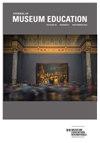Understanding Facilitation Techniques for Hands-On Chemistry Activities
IF 0.6
Q3 EDUCATION & EDUCATIONAL RESEARCH
引用次数: 1
Abstract
ABSTRACT Educators play a key role in facilitating interactive learning experiences in informal science education settings, such as science centers and museums. Despite their importance, research around facilitation has generally focused on visitor impacts and not the strategies used by the educators themselves. The ChemAttitudes project studied and characterized facilitation moves used by educators during hands-on chemistry activities with visitors at two science museums. Building on previous research done by the Exploratorium, the project team defined a framework of three overarching categories of facilitation techniques: “Invite participation,” “Support exploration,” and “Deepen understanding.” (referenced in short form as “Invite,” “Support,” and “Deepen”). Each of these categories also included distinct facilitation moves that educators used throughout an interaction with visitors. Overall, data indicated that educators used Support moves most often, Deepen moves less frequently, and Invite moves the least. Although educators almost always started an interaction with Invite, afterwards, they moved flexibly back and forth between the three types of moves in a non-linear order in response to the visitors. The framework and findings from this project can be used to support training and professional development for other informal educators using hands-on activities with visitors.了解动手化学活动的促进技巧
在科学中心和博物馆等非正式科学教育环境中,教育工作者在促进互动式学习体验方面发挥着关键作用。尽管它们很重要,但围绕促进的研究通常集中在游客的影响上,而不是教育者自己使用的策略。化学态度项目研究并描述了教育工作者在两个科学博物馆与参观者进行动手化学活动时使用的促进动作。在Exploratorium之前所做的研究的基础上,项目团队定义了一个由三大类促进技术组成的框架:“邀请参与”、“支持探索”和“加深理解”。(简称为“邀请”、“支持”和“深化”)。这些类别中的每一个还包括教育工作者在与游客互动过程中使用的不同的促进动作。总体而言,数据表明教育工作者最常使用支持移动,加深移动频率较低,邀请移动最少。虽然教育工作者几乎总是开始与Invite互动,但之后,他们以非线性的顺序在三种类型的动作之间灵活地来回移动,以响应访客。这个项目的框架和结果可以通过与来访者的实践活动来支持其他非正式教育工作者的培训和专业发展。
本文章由计算机程序翻译,如有差异,请以英文原文为准。
求助全文
约1分钟内获得全文
求助全文
来源期刊

Journal of Museum Education
EDUCATION & EDUCATIONAL RESEARCH-
CiteScore
1.20
自引率
16.70%
发文量
34
期刊介绍:
The Journal of Museum Education (JME) is the premier peer-reviewed publication exploring and reporting on theory, training, and practice in the museum education field. Journal articles—written by museum, education, and research professionals—explore such relevant topics as learning theory, visitor evaluation, teaching strategies for art, science, and history museums, and the responsibilities of museums as public institutions. Published 4 times a year, each issue consists of a guest edited section focused on a specific theme and articles about new research, current trends, tools, frameworks, and case studies, perspectives, and book, exhibit, and program reviews.
 求助内容:
求助内容: 应助结果提醒方式:
应助结果提醒方式:


